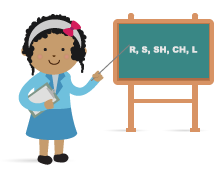
Cleft Palate is an abnormal facial deformity that occurs during fetal development. A cleft is an opening or gap that occurs in the lip or palate when the body’s natural structures do not fuse properly before birth. The cleft may occur in the lip, the palate of the mouth or both and may be one sided or bilateral. Because of the gap in the oral and nasal cavity, air leaks into the nasal cavity and tends to distort vocal quality. If the cleft affects the clearing of the Eustachian tubes in the ear, hearing loss can also occur which introduces difficulty with language acquisition and speech production.
Children are born with cleft palate and diagnosis takes place at the time of birth. There are many different severities of cleft palate. A cleft palate can manifest itself in several ways - it can be a small indentation at the top of the lip, or can continue into the nasal cavity. Hearing may also be obstructed if the cleft blocks the Eustachian tubes (middle ear cavity).
Diagnosis can take place before the baby is born during an ultrasound or when the baby is born after examining the baby.
It is easy to treat a child with a cleft palate with surgery, depending on the severity of the cleft. Usually in the first 2-3 months of birth doctors will close the cleft. If the cleft is bilateral, it may take two surgeries to close the cleft.
An ear tube (called a tympanosotomy) can be inserted to open up the middle ear in the event that fluid is accumulating and hearing is obstructed due to the cleft. A common speech problem that occurs due to cleft palate is called “velopharngeal inadequacy,” which is when the soft palate does not close between the oral and nasal cavities. This allows too much air to escape between the throat and the nose making it hard to pronounce certain sounds like “B” and “T” clearly. As well, other speech errors commonly occur and do not always go away after surgery, making a child’s speech hard to understand.
Surgery is the best treatment of cleft palate. If the child continues to have difficulties producing or articulating sounds, working with a speech language pathologist in a school or private setting can help teach them the sounds they have a hard time articulating.
Speech Buddies have proven to be very helpful with children who have struggled with articulation due to cleft palate. Speech Buddies work best when introduced after surgery to close the cleft is complete. Check out the results: http://youtu.be/T41wqeXtJbk
Articulation Disorder, Apraxia of Speech, Autism, Cerebral Palsy, Down syndrome, Fragile X Syndrome, Language Disorder, Speech Delay, Stuttering
References:

Please contact us for immediate help with your request.
![]() 1-866-247-8030
1-866-247-8030
![]() info@speechbuddies.com
info@speechbuddies.com
Outside of business hours? You will be contacted as soon as we are open.
To choose a new speech therapist, please contact us.
![]() 1-866-247-8030
1-866-247-8030
![]() info@speechbuddies.com
info@speechbuddies.com
Outside of business hours? You will be contacted as soon as we are open.
You can reschedule your appointments anytime. We ask that you give us at least 24 hours notice to avoid any unnecessary fees or complications. You will not be charged for any of your sessions until the day of that appointment.
Your speech therapist likely gave you a recommended treatment plan in your first session. If not, make your best guess – you can always modify your package later.
Your message has been sent. or close this window to continue.
Your discount code will be sent to your email shortly.
 I am a parent
I am a parent
 I am a Speech Therapist
I am a Speech Therapist